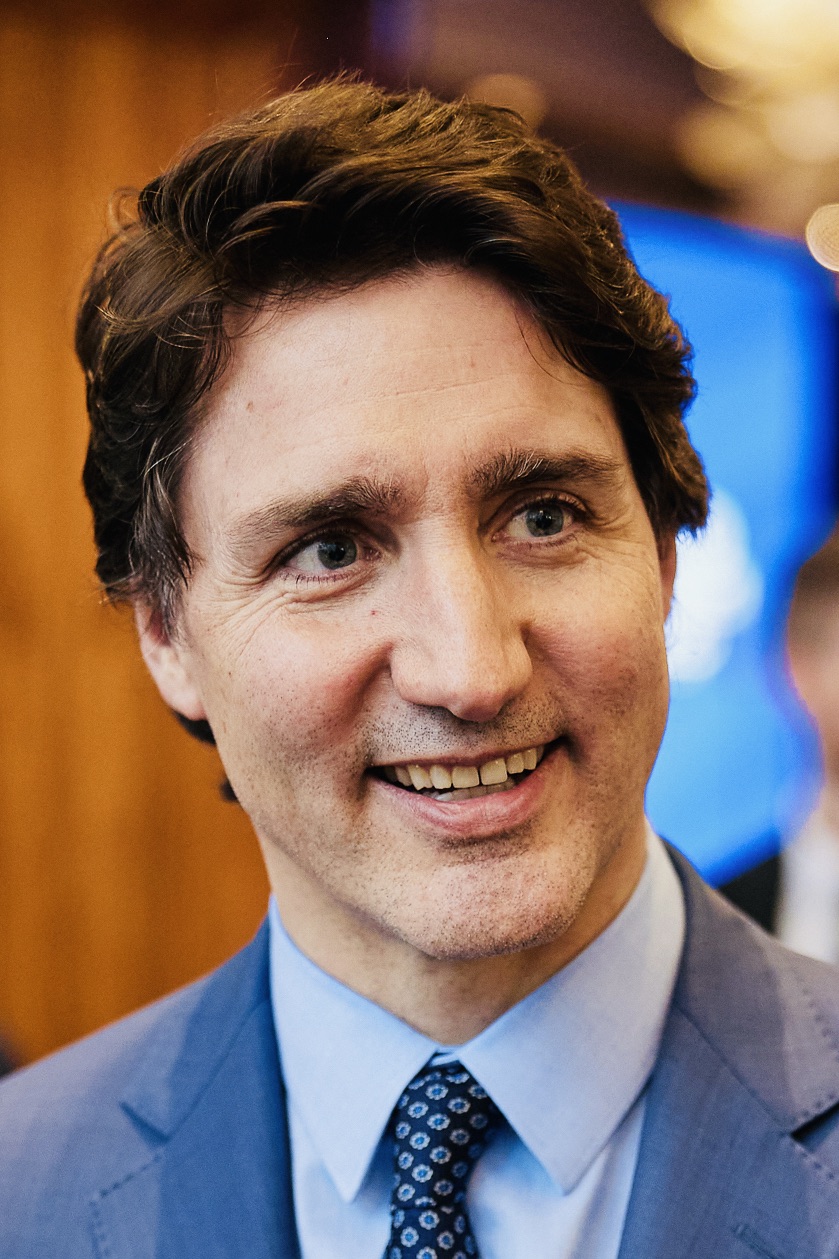Regrettably, Canada has voted for a United Nations General Assembly resolution calling for a humanitarian ceasefire in the Gaza Strip, where Israel and Hamas have been locked in fierce combat since the end of October.
Until yesterday, Canadian Prime Minister Justin Trudeau resisted pressure to support an immediate truce, understanding that Israel requires far more time to complete its complex military mission in Gaza, which Canada has fundamentally supported as necessary to Israel’s security.
But even as Trudeau previously resisted the call for a ceasefire, Foreign Minister Melanie Joly advocated one. Trudeau, however, supported “humanitarian pauses” to allow aid to reach the 2.2 million Palestinians of Gaza. And at one point, he urged Israel to exercise “maximum restraint” in its urban warfare campaign to destroy Hamas’ military capabilities and permanently remove it as Gaza’s governing authority.
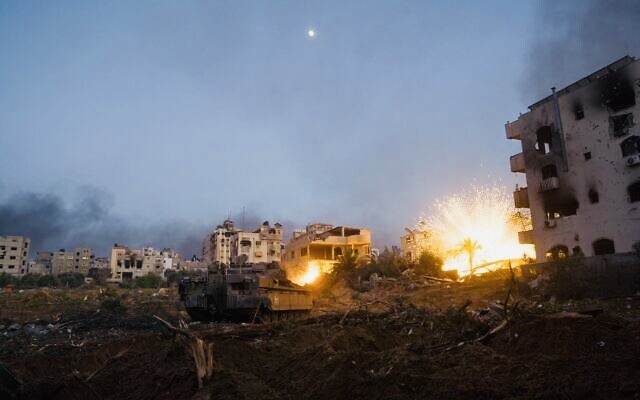
But on December 12, in a seismic shift away from its practice of voting with Israel on major resolutions at the United Nations, Canada endorsed a resolution demanding a ceasefire in Gaza.
Israel’s ambassador to Canada, Iddo Moed, expressed disappointment, saying that it “does not call out Hamas for its horrendous acts of terrorism against Israelis and does not address the root cause of the situation.”
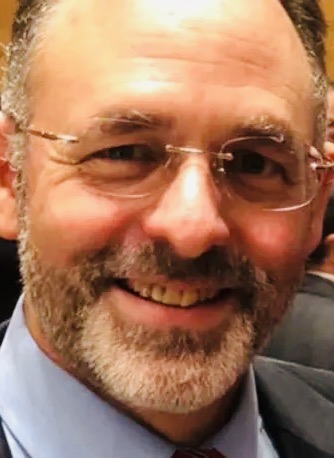
The Israeli ambassador to the United Nations, Gilad Erdan, charged that it was intended to “tie Israel’s hand” and to perpetuate Hamas’ “reign of terror.”
It’s a cogent argument that will not fall on deaf ears in Israel.
Anthony Housefather, a Jewish Liberal Party member of Parliament from Montreal, expressed disagreement with Canada’s new position. “In my view, any cessation of hostilities requires Hamas to release all hostages and lay down arms and surrender. Hamas, a terrorist organization, is entirely responsible for starting this war,” he wrote on the social media platform X, which was formerly known as Twitter.

Although the resolution stopped short of condemning Hamas, it was backed by no less than 153 countries in an unmistakable sign of global support for ending the war, which has so far claimed the lives of 18,600 Palestinians and 115 Israeli troops. Ten nations voted against it and 23 abstained.
Yesterday’s resolution was demanded by Arab and Muslim states after the United States, Israel’s chief ally, vetoed a Security Council motion on December 8 calling for a humanitarian truce.
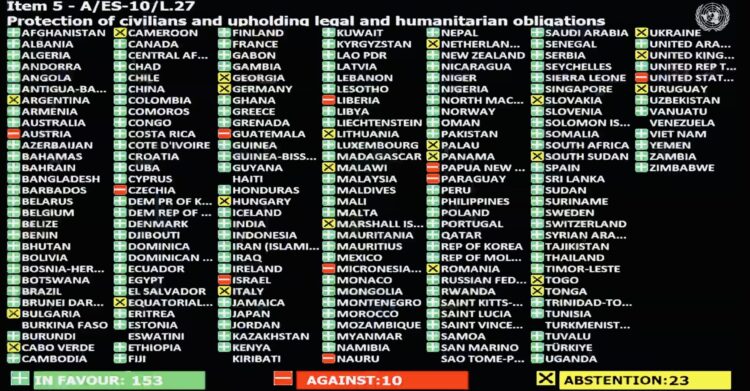
A similar motion on October 27 passed by a margin of 120-14. Canada was among 45 countries that abstained.
The latest resolution passed as Israel began flooding Hamas’ tunnels with sea water and as U.S. President Joe Biden warned Israel that it is losing international backing due to “indiscriminate bombing.”
Biden supports Israel’s twin objectives of eradicating Hamas and freeing its hostages, but as he has repeatedly told Israeli Prime Minister Benjamin Netanyahu, Israel must try much harder to avoid civilian casualties.
On the eve of yesterday’s vote, Joly, who waited two whole months before deploring Hamas’ systematic rape and sexual assault of Israeli women, said that Israel had to conduct its operations in Gaza in accordance with international humanitarian law.
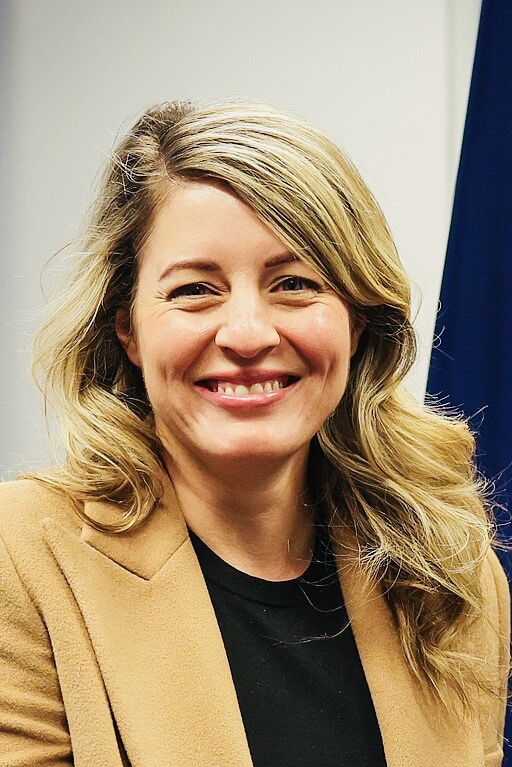
And hours before the resolution was formally presented, she said, “From the very beginning, we have said that Israel has the right to defend itself. But how Israel defends itself matters.” She added that Israel’s conduct of the war “will not lead to the durable defeat of Hamas,” but insisted nonetheless that Hamas must surrender and release the remaining hostages.
A day before the resolution was introduced, Joly met the foreign ministers of Saudi Arabia, Turkey and the Palestinian Authority in Ottawa.
And hours before the Canadian ambassador voted for it, Canada, Australia and New Zealand, in a joint statement, unequivocally condemned Hamas’ terrorist attacks in southern Israel on October 7, which claimed the lives of 1,200 Israelis and foreigners and resulted in the kidnapping of 240 men, women, children and babies.
Decrying “heinous acts of violence perpetrated in those attacks, including sexual violence,” Canada condemned Hamas’ “unacceptable treatment of hostages” and called for their immediate and unconditional release.
“We recognize Israel’s right to exist and right to defend itself,” the statement went on to say. “In defending itself, Israel must respect international humanitarian law. Civilians and civilian infrastructure must be protected. We are alarmed at the diminishing safe space for civilians in Gaza. The price of defeating Hamas cannot be the continuous suffering of all Palestinian civilians.
“We remain deeply concerned by the scale of the humanitarian crisis in Gaza and ongoing risks to all Palestinian civilians. Safe and unimpeded humanitarian access must be increased and sustained.
“The recent pause in hostilities allowed for the release of more than 100 hostages and supported an increase in humanitarian access to affected civilians … We want to see this pause resumed and support urgent international efforts towards a sustainable ceasefire. This cannot be one-sided. Hamas must release all hostages, stop using Palestinian civilians as human shields, and lay down its arms.
“There is no role for Hamas in the future governance of Gaza.
“We support Palestinians’ right to self-determination. We oppose the forcible displacement of Palestinians from Gaza, the re-occupation of Gaza, any reduction in territory, and any use of siege or blockade. We emphasize that Gaza must no longer be used as a platform for terrorism. We reaffirm that settlements are illegal under international law. Settlements and settler violence are serious obstacles to a negotiated two-state solution.”
“We condemn rising antisemitism, Islamophobia, and anti-Arab sentiment in our countries and around the world …”
In Canadian political circles, there was a groundswell for a ceasefire, with the New Democratic Party, the Bloc Québécois, the Green Party, and about two dozen Liberal MPs supporting one.
Conspicuously enough, the Conservative Party, which has been gaining Jewish support in recent years, did not push for a ceasefire.
A parliamentary e-petition in support of a truce, initiated by Maëva Gaudrault from Montreal and sponsored by Alexandre Boulerice, an MP representing the riding of Rosemont-La Petite-Patrie, received 286,700 signatures. It urged Canada to support an immediate ceasefire and asked Israel and Egypt to lift their respective blockades of Gaza, which has been controlled by Hamas since 2006.
An immediate ceasefire was demanded by over 300 Muslim organizations and mosques, including the National Council of Canadian Muslims, Friends of Palestine Canada, the Islamic Institute of Ontario and the Islamic Center of Quebec.
Some Canadian Muslim donors threatened to withdraw their financial support of the ruling Liberal Party.
More than 200 Canadian civil society organizations signed a joint statement in support of a ceasefire. They ran the gamut from the Canadian Union of Postal Workers and the National Union of Public and General Employees to the United Church of Canada and Independent Jewish Voices Canada.
It’s clear that many Canadians wanted a ceasefire without fully understanding its broader implications.
